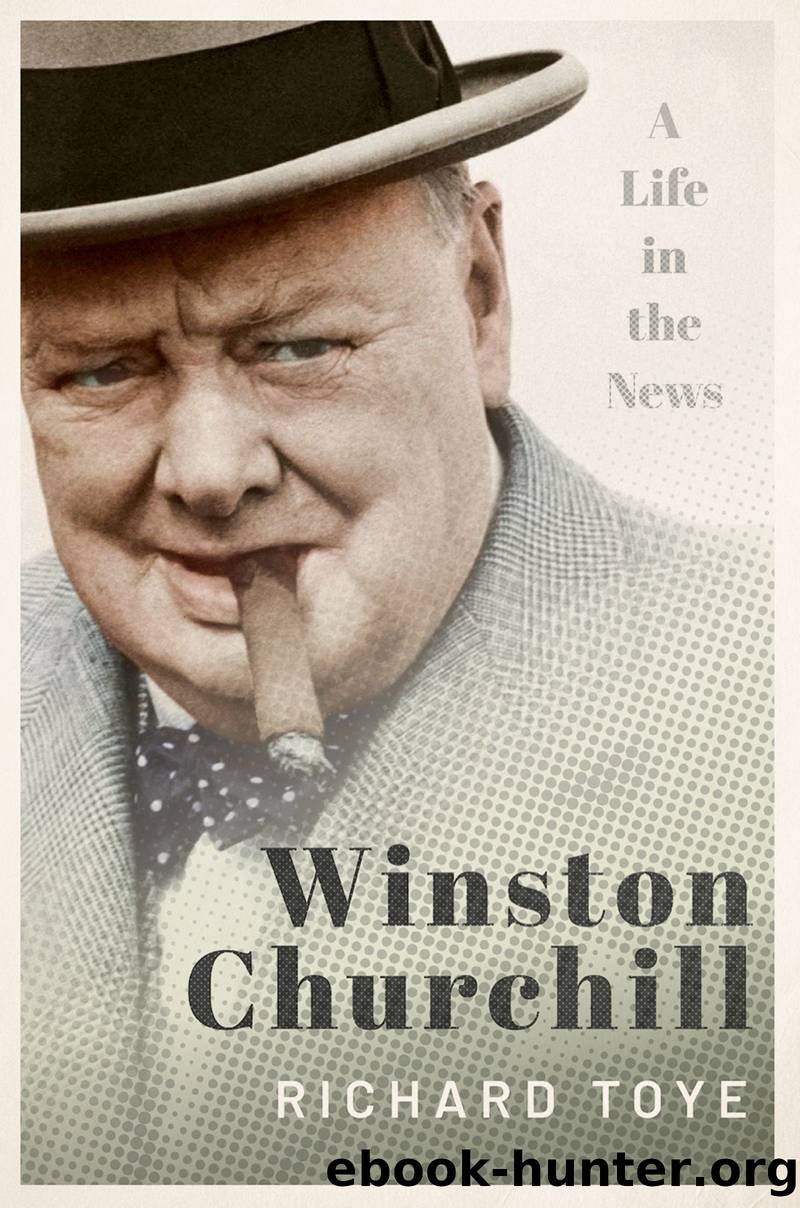Winston Churchill by Richard Toye

Author:Richard Toye [Toye, Richard]
Language: eng
Format: epub
ISBN: 9780192526038
Publisher: OUP Oxford
Published: 2020-02-08T00:00:00+00:00
7
‘The War is not Fought to Amuse the Newspapers’
It began with a cartoon. It came from the pen of Philip Zec, a London-born Jewish socialist of Russian descent. Having worked as a much sought-after advertising illustrator, at the outbreak of World War II, when he was about to turn thirty, he was recruited by the Daily Mirror as a political cartoonist, even though he had no previous experience of that role. His powerful anti-Nazi cartoons were a valuable propaganda weapon, which led to the frustration of his desire to join the forces. ‘I was already virtually in the RAF’, he recalled. ‘I waited for my damned ticket but it never turned up. I didn’t get into the RAF. The Government decided I was more useful where I was.’1 But as Churchill’s relationship with the Mirror soured during the early months of his premiership, Zec annoyed him with a ‘singularly mischievous’ cartoon which portrayed Emperor Hirohito as the middle link in an evolutionary chain that started with an ape and Neanderthal man, rising through Mussolini and at last Hitler. Churchill considered it offensive, but he was not concerned with the racism so much as the risk that it might strengthen the hand of the War Party in Tokyo, at a sensitive time in Anglo-Japanese relations.2 This, however, was merely a minor prelude to the storm that erupted over Zec’s cartoon of 5 March 1942 which showed a physically-drained merchant seaman clinging to a raft, under louring skies, after his ship had been torpedoed. The caption read: ‘The Price of Petrol Has Been Increased by One Penny—Official’.
Zec’s intention was to show that bringing fuel to Britain in wartime was a highly dangerous business; therefore people should be careful not to waste it. There is evidence to suggest that this is the way that the public interpreted it too.3 Churchill and his colleagues, however, read it as an accusation that the men’s lives were being thrown away in the interests of oil company profits. As far as they were concerned, the cartoon was merely one aspect of a much broader pattern of offence, whereby the paper systematically published material calculated to foment opposition to the prosecution of the war. Theoretically, at least, this was something that could lead to its suppression under Defence Regulation 2D.4 During a lunchtime conversation with W. P. Crozier, Churchill was ‘very hot and strong’ about the question of the Mirror, and wanted to ‘flatten them out’, although he also complained about the News Chronicle, the Daily Herald, the Daily Mail ‘and its Sunday paramour, the Sunday Dispatch’. Crozier asked Churchill why he was so sensitive about newspaper criticism, given that he had a great Commons majority and the backing of the country as a whole. Churchill responded that he did not think he was being treated fairly and that the prestige of the government was being injured. But Crozier discerned that the press attacks hurt him because he was simultaneously experiencing ‘anguish and self-reproach’ at the loss of Singapore.
Download
This site does not store any files on its server. We only index and link to content provided by other sites. Please contact the content providers to delete copyright contents if any and email us, we'll remove relevant links or contents immediately.
Blood and Oil by Bradley Hope(1566)
Wandering in Strange Lands by Morgan Jerkins(1429)
Ambition and Desire: The Dangerous Life of Josephine Bonaparte by Kate Williams(1394)
Daniel Holmes: A Memoir From Malta's Prison: From a cage, on a rock, in a puddle... by Daniel Holmes(1336)
Twelve Caesars by Mary Beard(1324)
It Was All a Lie by Stuart Stevens;(1300)
The First Conspiracy by Brad Meltzer & Josh Mensch(1174)
What Really Happened: The Death of Hitler by Robert J. Hutchinson(1167)
London in the Twentieth Century by Jerry White(1149)
The Japanese by Christopher Harding(1134)
Time of the Magicians by Wolfram Eilenberger(1131)
Twilight of the Gods by Ian W. Toll(1123)
A Woman by Sibilla Aleramo(1097)
Cleopatra by Alberto Angela(1096)
Lenin: A Biography by Robert Service(1080)
John (Penguin Monarchs) by Nicholas Vincent(1071)
The Devil You Know by Charles M. Blow(1028)
Reading for Life by Philip Davis(1027)
The Life of William Faulkner by Carl Rollyson(993)
